- April 27, 2025
Welcome to Dementia World elderly home services

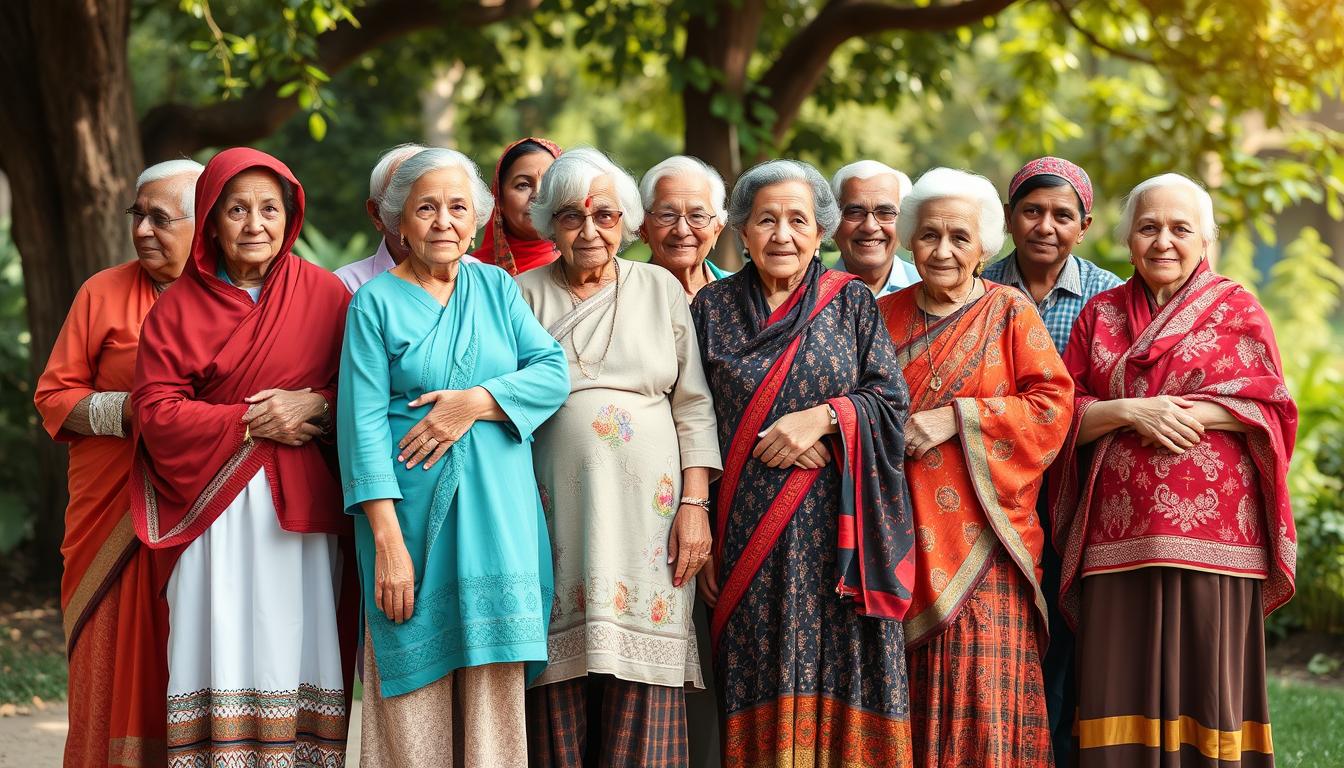

The number of older people in low-income and middle-income countries is set to jump by 185% by 2050. This makes the need for good dementia care even more urgent. Alzheimer’s disease and related dementias affect people from all cultures and backgrounds, putting a strain on healthcare systems everywhere.
It’s vital to understand how different cultures approach dementia care. This is because Latino and Asian communities are growing fast and are changing how we care for the elderly. By recognising and tackling the ethnic and racial gaps in dementia care, we can create better strategies for diverse populations.
Research shows a worrying gap: older Black and Latino people in the USA are more likely to have Alzheimer’s but often don’t get diagnosed. This highlights the need for care that understands and respects different cultural practices. The mix of memory loss, cultural values, and healthcare is complex and needs careful study and outreach.
Dementia is seen differently in various cultures. This affects how people and families deal with memory loss. In some places, dementia is linked to shame, causing people to feel isolated.
In the USA, shame about dementia stops many from seeking help. This shame makes people feel lonely and like a burden. Sadly, 48% of dementia patients in the UK feel this way too.
Language also plays a big role in how dementia is understood worldwide. In China, dementia is called ‘stupid, demented elderly’. This name can spread wrong ideas about the condition. People with dementia often face jokes and being left out because of their diagnosis.
Getting help and support can be hard because of these cultural views. In rich countries, there are more resources for dementia care. But in poor countries like China, care is too expensive and not enough. In Canada, a survey showed that BIPOC communities face challenges in getting the right care because of a lack of understanding and resources.

Cultural beliefs greatly affect how we care for people with dementia. They influence how we see symptoms and whether we seek help. Different cultures view dementia in unique ways, shaped by their views on ageing and illness.
In some cultures, dementia is seen as a normal part of ageing. Others believe it’s due to past actions. These beliefs deeply impact dementia care impact.
Many minority groups face stigma around dementia. Over 50% of Black, Hispanic, and Asian Americans think Alzheimer’s is just ageing. This misunderstanding can delay care, causing stress for caregivers.
Black people are diagnosed with Alzheimer’s twice as often as whites. Over 60% of Black Americans know someone with dementia. Hispanic Americans also face similar challenges, with 9 out of 10 believing their ethnicity should guide healthcare.
These facts highlight the need for care that respects cultural differences. Cultural beliefs and health perceptions shape the support for dementia patients.
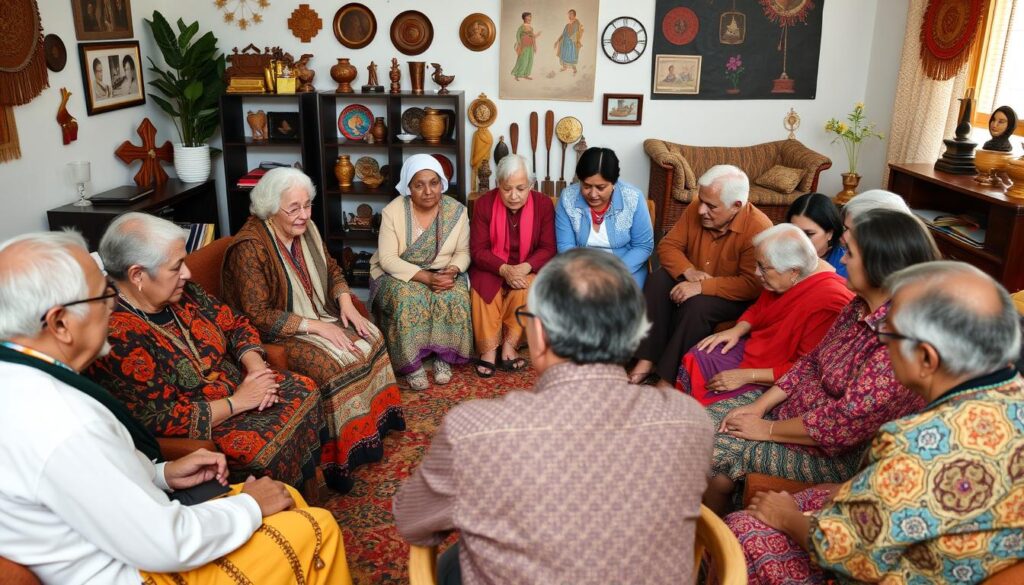
Asian American communities also face biases, with 40% worried about being overlooked in research. Healthcare needs to adapt to diverse cultures. Training in cultural competence is key to providing care that respects individual backgrounds.
| Ethnic Group | Likelihood of Developing Alzheimer’s | Belief about Early Signs | Importance of Cultural Consideration |
|---|---|---|---|
| Black Americans | Twice as likely | 50% view as normal ageing | 60% know someone with dementia |
| Hispanic Americans | Higher likelihood than others | 50% view as normal ageing | 90% advocate for cultural considerations |
| Asian Americans | Concerns around bias | 40% view bias in research | Need for religious sensitivity |
| Native Americans | 1 in 3 likely to develop | No specific belief highlighted | N/A |
| LGBTQ Individuals | 2.7 million affected | No specific belief highlighted | Double likelihood of being alone |
It’s essential to address cultural beliefs about dementia to improve care. By understanding and using these beliefs in caregiving, we can create a better environment for those with dementia and their families.
Cultural contexts shape how we support people with memory loss around the world. It’s key to understand the cultural context of memory loss to create effective support. Different places have unique ways of dealing with memory loss, from family support to professional care.
These differences show we need support tailored to each culture. This ensures everyone gets the help they need.
In different cultures, how we see memory loss and dementia changes a lot. This affects the dementia support structures we use. For example, in many Asian cultures, family is very important.
Here, families often take on the caregiving role. In contrast, some societies focus more on professional care. This shows how support varies based on culture.
Support for memory loss varies in both philosophy and access. Language barriers can make it hard to get dementia care. Also, some people don’t understand dementia well, which can lead to less diagnosis and treatment.
For example, many think dementia is just a part of getting older. This can stop people from getting help early.
Here are some numbers to show these differences:
| Region | Support Structure Type | Percentage of Culturally Diverse Individuals Receiving Care |
|---|---|---|
| North America | Dementia friendly communities | 22% |
| Australia | Family-based support | 40% |
| Europe | Community resources | 35% |
| Asia | Integration with traditional practices | 25% |
This data shows the different ways to support memory loss across the globe. Things like money, culture, and how easy it is to get help all play a part. Knowing these differences helps us make support that fits everyone’s needs.

Looking at elderly care worldwide shows big differences, mainly between rich and poor countries. These gaps affect how dementia patients get help. It’s important to understand these differences to see the challenges and new ideas in caring for dementia.
Rich countries have better and more modern care for the elderly. They offer many services to meet different needs, making sure each patient gets the right care. Poor countries, though, struggle with not enough money and resources. They often use community help to support those in need.
Looking at examples from around the world shows both successes and failures in dementia care. For instance, a study in China found it hard to support over 15 million older adults with dementia. The country’s family structure, where one couple cares for four elderly members, makes it tough to get the right elderly care services.
But, a Western European country started a new community program. It used local volunteers to help with the care, improving the quality of life for those with dementia. This shows how we can make global elderly care better, no matter the country’s wealth.
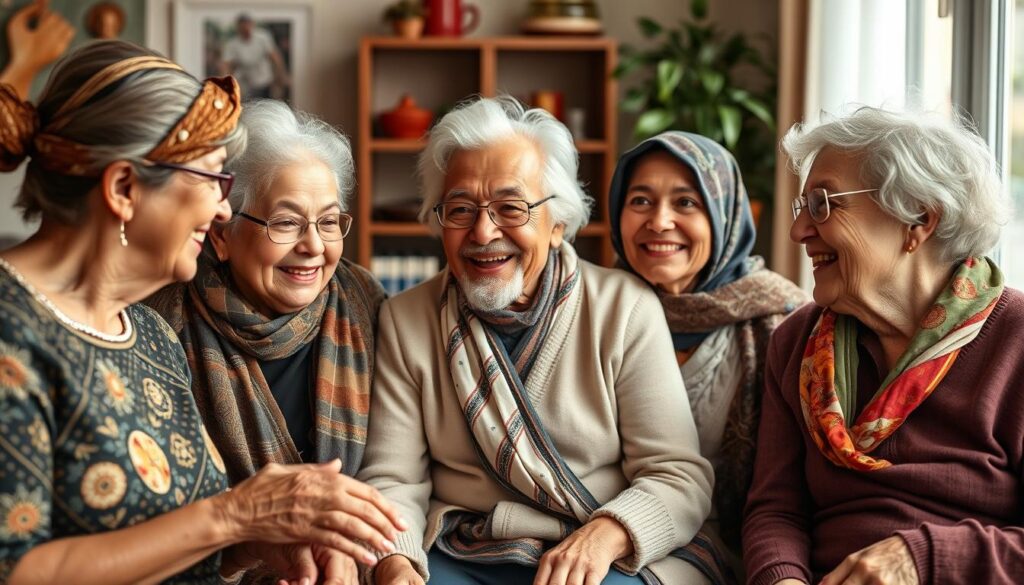
Alzheimer’s care varies a lot across cultures. It’s shaped by local customs, healthcare systems, and views on ageing. In the United States, about 5.5 million people have Alzheimer’s. This highlights the need for good care.
New methods like light and music therapy are being used. They aim to improve life quality for those with Alzheimer’s.
Worldwide, 50 million people live with dementia, says Alzheimer’s Disease International. Countries like Japan are starting new programmes, like Learning Therapy. These show early signs of better care.
Everyone’s care needs are different. This is why person-centred care is key everywhere.
In the UK, the Dementia Friends initiative aims to raise awareness. It helps build a community that understands dementia better. The Dutch model is also unique, with places like Hogeway. These are special environments for people with dementia.
Australia shows the government’s role in dementia care. The government helps fund and manage long-term care. This shows a strong commitment to support.
The cost of dementia care is huge, expected to be 2.8 trillion U.S. dollars a year. This makes it urgent to find good ways to care for people with Alzheimer’s.
Improving care is key. The Dementia Ideal Care Map includes over 200 best practices and 100 technology enablers. These aim to make life better for those with dementia.
Training and support for caregivers are vital. They help deal with the disease’s complexities.

More than 55 million people worldwide live with dementia. Over 60% of them are in low- and middle-income countries. Societies view dementia differently, affecting how we manage cognitive decline.
Each culture offers its own ways of dealing with dementia. This shapes how families and professionals care for those affected. It’s all about understanding and respecting these differences.
In many places, family support is key in managing cognitive health. Family members often care for their loved ones for about 5 hours a day. Women do 70% of this caregiving, showing how gender roles play a part in elder care.
On the other hand, some cultures focus more on professional care and training. This shows the importance of adapting care to fit each culture’s needs. What works in one place might not work in another.
It’s important to understand how societies view dementia to create better care plans. Risk factors like age and high blood pressure are common everywhere. But, we must also consider local attitudes and resources.
Changes in behaviour and mood can signal dementia before memory loss. Being aware and taking action early is vital. Building supportive communities and keeping people connected can help slow cognitive decline.

Looking at the world, we see a pressing need to better understand dementia. We must incorporate societal views into our care practices. This not only improves the lives of those with dementia but also supports their caregivers.
Dementia care in the Asian community is deeply rooted in cultural traditions and modern methods. Family care is key, with a focus on respecting elders. Communities come together to support those affected, improving their lives. Yet, urbanisation and changing family structures bring new challenges, making new dementia support ideas vital.
The care for dementia in Asia blends old values with new methods. Family care is a cornerstone, driven by a sense of duty and community. The Asian Pacific Islander Dementia Care Network (API DCN) supports these caregivers. It was set up in Los Angeles and has helped many communities.
It started with Chinese, Vietnamese, and Japanese families. Later, it included Korean and Filipino families too.
Despite strong family care, caregivers face big challenges. A study found 25% of Asian Americans lack family support. Almost half worry about medical bias against people of colour. Also, 56% think memory loss is just part of ageing, which can delay help.
New ideas in dementia care are essential. Programs that offer culturally-sensitive help are very important. They include care counselling and respite care. Working with the Alzheimer’s Association also helps, providing support in many languages.
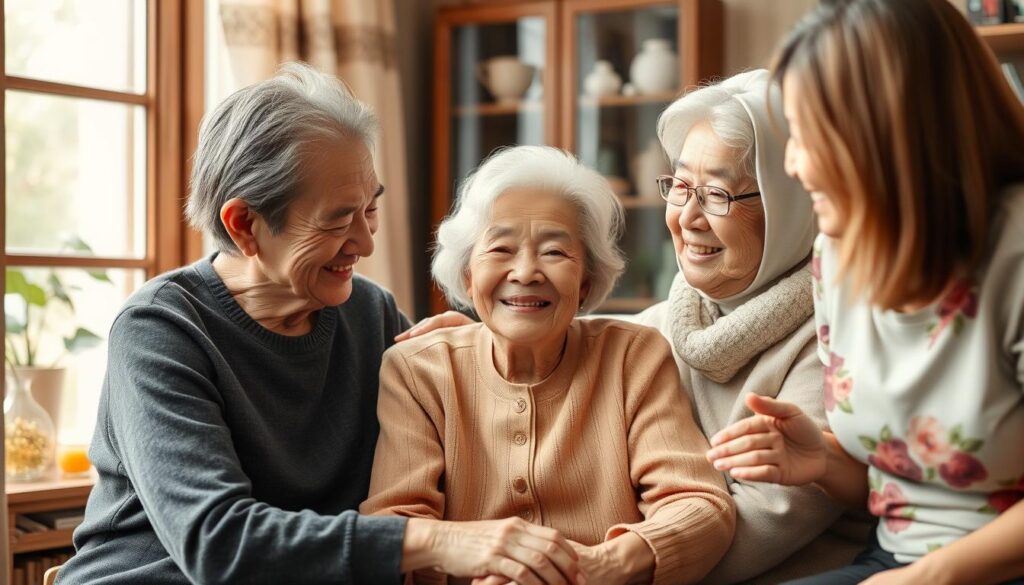
The number of people with dementia is growing fast. In the U.S., nearly 7 million are living with Alzheimer’s or dementia. This puts a lot of pressure on families and caregivers.
Now, new dementia support programs are showing promise. They offer different ways to help those affected.
The Integrated Memory Care Clinic (IMC Clinic) is a great example. It started in 2015 and has been praised for its care model. In 2022, it got a big grant to grow its services.
It began with hundreds of patients in Atlanta. Now, it has 19 staff members and wants to help 500 more people. This shows how nurses can make a big difference in dementia care.
The IMC Clinic also works with senior living communities more. It has six partnerships now, up from one. This shows how memory care and community work together.
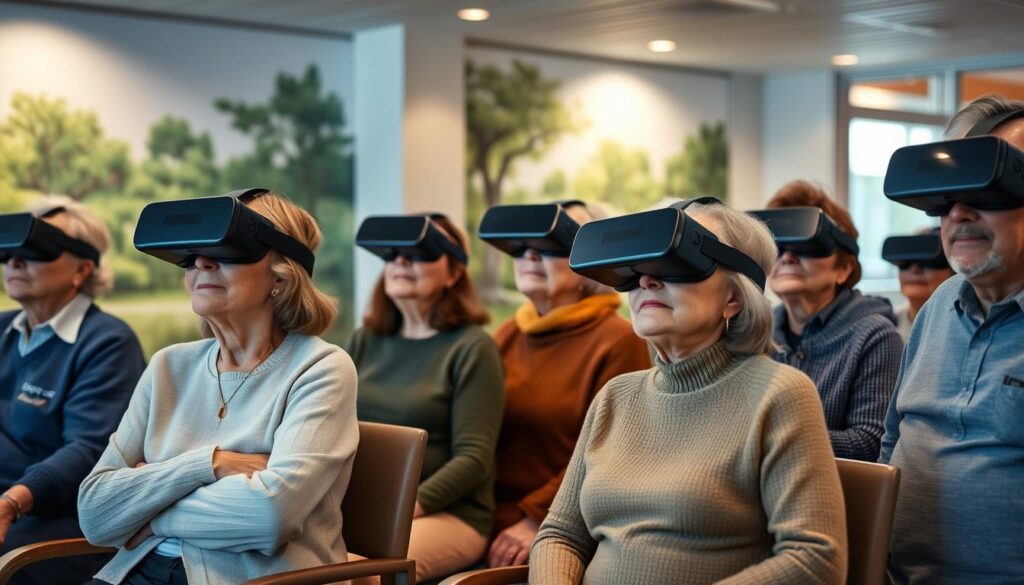
Programs like the Accelerator Programme have also made new partnerships. They focus on using technology to help dementia patients. For example, the Else London product helps with daily tasks.
Recreo VR offers virtual reality to bring back memories. Cognitive Books aims to make reading fun for those with dementia. These are just a few examples of how technology is being used to help.
More people with dementia are using the internet. This means there’s a need for safe online tools. The Phylax browser extension helps with online shopping, keeping patients safe.
The Accelerator Programme works with users to improve its tools. This ensures the innovations are effective in helping dementia patients.
These global programs aim to improve life for those with dementia. They also work to include them in society. Sharing these successes helps everyone learn and work together.
Geriatric nursing care is key in health services, focusing on the elderly from different cultures. It’s vital to be culturally aware in nursing to meet the unique needs of each patient. This approach builds trust and improves health outcomes and patient happiness.
Diverse needs in older adults, like those with dementia, show the importance of cultural sensitivity. Economic status, religious beliefs, and social norms influence care perceptions. For example, Latino seniors often prefer family care over institutional settings.
Language barriers can make communication tough in elder care. Nurses trained in cultural competence help by providing language services. Federal laws require healthcare to support those with limited English, stressing the need for cultural awareness.
The following table presents various aspects of cultural competence and nursing care diversity:
| Cultural Aspect | Impact on Geriatric Nursing Care | Strategies for Practice |
|---|---|---|
| Language Barriers | Can hinder communication and trust. | Offer interpretive services; train staff in communication skills. |
| Dietary Preferences | Influence health outcomes and patient satisfaction. | Incorporate culturally tailored meal plans; engage patients in meal planning. |
| Family Dynamics | Affects caregiving preferences and support. | Encourage family involvement in care; respect family traditions. |
| Socioeconomic Factors | Impact access to resources and quality care. | Advocate for resources for low-income families; facilitate community support. |
In conclusion, cultural competence in geriatric nursing care is essential. It leads to better health outcomes and respects individual cultural identities. As the older population diversifies, geriatric nursing care’s role in delivering fair and effective health services becomes even more critical.

Community views on dementia support groups are key to their success. These groups give vital help to caregivers and those with dementia. They show how important it is to make support groups fit local cultures, making them welcoming and easy to join.
In the United States, over 11 million family and friends care for people with dementia. This shows a big commitment to help those affected. With more than 12.7 million Americans expected to have dementia by 2050, the need for good support grows even bigger.
Support groups for dementia caregivers bring many benefits. Studies show they improve mental health, reduce stress, and lower depression. But, getting to these groups can be hard due to lack of transport and care for those with dementia. It’s vital to solve these problems to encourage more people to join.
In Ontario, Canada, about 255,000 people live with dementia. For over 30 years, caregiver support groups at the Community Psychiatric Services for the Elderly (CPSE) have been a big help. These groups are open at any time, with no limit on visits.
Support groups need to keep changing to meet the needs of different people. By listening to community views on dementia, we can make support networks stronger and more effective.
| Statistics | Details |
|---|---|
| People aged 65+ living with dementia in the US | More than 1 in 9 |
| Care partners in the US | Over 11 million |
| Projected US dementia cases by 2050 | Over 12.7 million |
| Impact of caregivers in support groups | Positive effects on well-being, burden, anxiety, and depression |
| Years CPSE has offered caregiver support groups | Over 30 years |
| Ontario’s estimated dementia cases in 2020 | 255,000 |
Dementia care faces big challenges when dealing with many cultures. Barriers in care can make support hard. It’s key to understand that each culture sees things differently, affecting how we care for them.
Being culturally sensitive in caregiving helps a lot. It builds trust and understanding. It means we can tailor care to meet the needs of different people.
Cultural sensitivity is vital in caregiving. It helps patients, families, and healthcare workers understand each other better. Knowing about cultural differences helps us tailor care plans.
In places with many cultures, ignoring these differences can cause problems. It leads to misunderstandings and poor care.
Stigma around dementia stops people from getting help. Misconceptions make it hard for them to seek diagnosis and treatment. Educational campaigns can change these views.
By raising awareness, we can break down barriers in dementia care. This approach values every person’s experience, making care more inclusive.
The following table presents the projected prevalence of dementia and the associated barriers across various regions:
| Region | Projected Prevalence of Dementia by 2050 | Key Barriers |
|---|---|---|
| Global | 152 million | Mainly underdiagnosis and cultural stigma |
| Low-Income Countries | 68% of new cases | Lack of healthcare facilities and cultural attitudes |
| UK | 1.1% incidence rate | Stigmatization and under-usage of services |
| US | 6.7 million estimated cases | Delay in seeking care and misconceptions |
Adding cultural competence to dementia care is key to quality support. It’s about understanding and valuing different backgrounds. This makes care better for those with dementia. Here are some top ways to improve dementia care:
By focusing on these steps, care can become more welcoming. This not only helps those with dementia but also their families. It’s all about giving everyone the care they need and deserve.
Dementia care is complex, influenced by many cultural beliefs and practices. With about 50 million people worldwide living with dementia, it’s more important than ever to understand how culture affects care. Different cultures bring unique views that can make care better, meeting the needs of individuals and families.
Looking ahead, making care culturally sensitive is key for healthcare providers. The challenges and new ideas shared in this article show why we need to tailor care to fit different cultures. This will make life better for patients and improve their care experience.
In summary, the future of dementia care depends on valuing and using cultural perspectives. This approach will help both caregivers and patients, creating a place where dignity and respect are central to support efforts.
Dementia care is for people with dementia, like Alzheimer’s. It helps improve their life quality. It also supports caregivers and families dealing with memory loss.
Different cultures view dementia in unique ways. Some see it as ageing, others as past actions’ result. These views shape how people get help and care.
Support varies by culture. Some rely on family, others on community programs. This includes memory care and senior facilities.
High-income countries have better services but may miss cultural needs. Low-income countries face big challenges but find creative solutions.
People often think dementia is just ageing or punishment. These beliefs stop people from getting help early. It also affects support for patients and caregivers.
Innovations like technology and community programs are key. They meet practical needs and help people with dementia feel included.
Geriatric nursing is essential for culturally sensitive care. Nurses are trained to respect different cultures, ensuring care is right for each person.
Support groups offer emotional and practical help. They create a community, share strategies, and reduce isolation.
Barriers include stigma, lack of awareness, and misconceptions. Cultural sensitivity is key to overcome these through education and support.
Best practices include ongoing education for healthcare providers. Engaging with the community and using respectful communication strategies are also important.